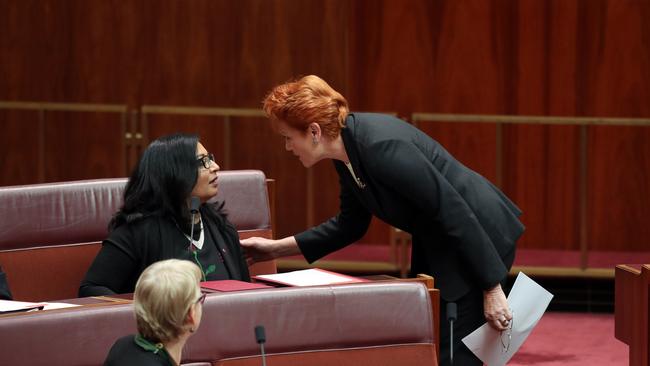Justice finds Twitter survey admissible in Greens senator’s defamation case against Pauline Hanson
The Greens senator polled the reactions of almost 800 users to Pauline Hanson’s tweet saying she should ‘piss off back to Pakistan’.

A bitter legal stoush between Greens deputy leader Mehreen Faruqi and One Nation’s Pauline Hanson will hinge on scholarly material illustrating the health impacts of racism and responses to online survey responses, a court verdict has determined.
A series of statements made by Twitter users who were offended by Senator Hanson’s suggestion that Senator Faruqi should “pack (her) bags and piss off back to Pakistan” will form a central pillar of Senator Faruqi’s legal case.
The conflict began after Queen Elizabeth II death, when Senator Faruqi tweeted: “I cannot mourn the leader of a racist empire built on stolen lives, land and wealth of colonised peoples”. That same day, September 9, Senator Hanson replied with the offending remark.
Senator Faruqi first took Senator Hanson to the Human Rights Commission before suing over the remark. She alleged in a court statement she had “been subject to a torrent of abusive phone calls, social media posts and hate mail” following the “piss off back to Pakistan” tweet.
As part of building evidence for the case, Senator Faruqi’s representation Marque Lawyers tweeted an online survey when proceedings began. The survey, titled “How Does It Make You Feel?”, asked participants “to indicate your view” on the tweets from Senator Hanson.
The survey was viewed by 9430 people, and 776 filled it out. Nine of them had their Twitter accounts tendered as evidence.
While the autobiographical affidavits that pulled material from the survey entered the court largely intact, the presiding judge placed a few caveats on them.
A reference by one lay-witness to Hanson’s 2017 “It’s okay to be white” senate motion was not admissible, and speculations on Senator Hanson’s state of mind by another lay-witness were found overly prejudicial.
“There is overwhelming authority in this court that evidence of individual people’s reaction to the conduct in question can be relevant,” the evidence ruling by Federal Court justice Angus Morkel Stewart reads.
“The evidence is not relevantly prejudicial or misleading.”
Faruqi’s representation, led by barrister Jessie Taylor, submitted 93 statements attributed to Senator Hanson through her political career, intended to litigate a serial pattern of racism on Senator Hanson’s part.
“This is not a Royal Commission into my client,“ Pauline Hanson’s silk Sue Chrysanthou argued at an interlocutory hearing on February 29. ”The question is, what she did on that day (September 9th 2022), and what she was thinking when she did it, not what she thought thirty years ago or said thirty years ago.“
The statements were largely deemed admissible, excluding a number of media reports which could be found to be hearsay. Quotations, recordings and statements published by Senator Hanson were still allowed before the court.
Among the tendered evidence deemed admissible by Justice Stewart were scholarly texts by researchers Yin Paradies and Amy Reynolds that detailed the health outcomes from experiencing racism.
The evidence was intended to demonstrate the harm Senator Faruqi suffered from Senator Hansons tweet, with the evidence ruling describing Prof Paradies’ assertion as “ “that racism can result in both acute and chronic emotional and psychological impacts … that can have significant consequences for immediate emotional and psychological health and can also result in long-term pathophysiological changes”.
Ms Chrysanthou contended across all categories of evidence that there were sections “infected” by material protected by parliamentary privilege. This was largely dismissed by Justice Stewart, whose Judgement suggested any remaining Parliamentary privilege concerns could be handled as they arise during proceedings.
The defamation case will be heard for five days from April 29. Senator Faruqi’s sought damages include a $150,000 charitable donation and an apology from Hanson.
Senator Hanson has alleged that she will argue the freedom of political speech trumps the Racial Discrimination Act in this circumstance, and has previously contended the remark was not racist.







